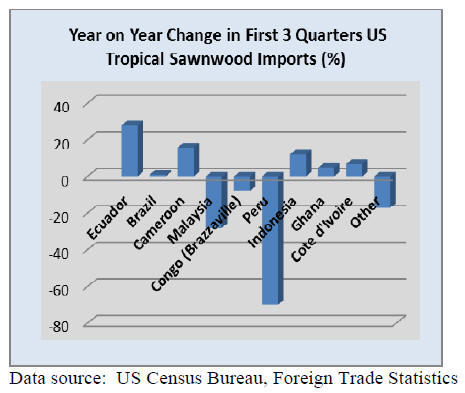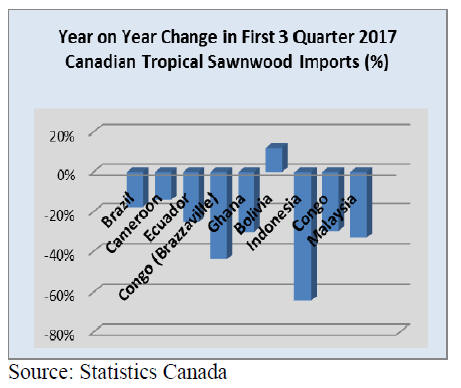|
Report from
North America
Brazil expands market share
US imports of temperate and tropical sawn hardwood
declined 13% in September from the previous month to
62,939 cu.m. Tropical sawnwood imports fell 22% to
16,755 cu.m., primarily due to a 40% drop in balsa
imports in September.
Imports of several other major tropical species were also
down in September, with the exception of ipe, virola and
mahogany. Ipe sawnwood imports increased 19% from the
previous month to 2,871 cu.m., while the value of
imported ipe grew at an even higher rate to US$6.5
million.
1,043 cu.m. of virola sawnwood were imported in
September, up 24% from August. The majority came from
Brazil, whose tropical shipments to the US reached 4,900
cu.m. in September due to the higher ipe and virola
imports.
Imports from Malaysia fell by more than half in
September. Keruing sawnwood imports were significantly
down from August. Imports of meranti, teak and jatoba
also declined from the previous month.

Canadian tropical imports up in September lead by
balsa
The value of Canadian imports of tropical sawnwood grew
by 11% in September to US$1.68 million (all values in US
dollars). Year-to-date imports were 4% lower than at the
same time last year.
Imports of virola, imbuia and balsa (combined) and
mahogany recovered from the drop in August. Unlike in
the US the growth was largely in balsa imports from
Ecuador, which more than tripled in September to
US$17,643.
At US$324,560 sapelli sawnwood imports were slightly
down in September, but year-to-date imports were
unchanged from the same time last year. Sapelli exports
from Cameroon grew to US$209,795 in September, while
Cameroon¡¯s shipments of ¡°other¡± tropical species to the
US reached US$237,457.

Note:
In addition to the sources mentioned above, Canadian
imports of tropical sawnwood from US sources in the first
9 months of this year more than tripled compared to 2016.
Imports from the US totalled more than 3 million cubic
metres accounting for around 25% of all tropical
sawnwood imports into Canada.
US architects and designers lack knowledge on
endangered species
Many US architects and designers have limited knowledge
of endangered and threatened wood species and often do
not know which alternative species or materials to use.
Even if they do know that a species is endangered, 40%
would still chose the wood if a client requested it.
These are the findings of a national survey of architects
and designers that was commissioned by laminate
manufacturer Wilsonart. The survey results were presented
at an event for architects in New York and reported by
Woodworking Network.
The survey also found that almost none of the survey
respondents could correctly identify most endangered
wood species from a list provided but 70% agreed that
using responsibly sourced wood is a priority.
Potential legal liabilities under Lacey Act are not well
understood by architects and designers.
Producers and suppliers of tropical wood products have a
significant opportunity and challenge to educate designers
in the US about tropical species, sustainable tropical forest
management and legal procurement.
A good starting point for understanding the educational
needs are the survey results and recommendations
provided on the Wilsonart website.
See:
https://www.wilsonart.com/understanding-wood
The survey respondents were designers, architects and
specifiers who work on a wide range of building projects,
including residential, office and hospitality.
Chemically modified pine for outdoor applications
The US internet portal Woodworking Network recently
featured the use of chemically modified radiata pine in a
landmark high-end apartment building near downtown
Washington DC. The pine product (Kebony) is used for
outdoor decking, benches and a pergola. The manufacturer
of Kebony compares its properties to ipe, teak and
thermally modified temperate species. While the product
falls short of ipe in hardness and dimensional stability, it
rates similarly to teak according to the Norwegian
manufacturer¡¯s data.
More US antidumping investigations
Enforcement of trade laws is a prime focus of the Trump
administration, according to the US Department of
Commerce.
Between January 20 and November 1 of this year the
department has initiated 77 antidumping and
countervailing duty investigations, which represents a 61%
increase from the same period in 2016.
The US Department of Commerce announced in early
November the final duties on sawn softwood products
from Canada. Five Canadian manufacturers were assessed
combined duties between 9.92% and 23.76%, while all
others will pay 20.83%.
US home builders and other users of Canadian softwood
criticized the decision since it will raise cost to US
consumers. Canadian manufacturers and their customers in
the US had hoped for a long-term settlement between the
two countries, similar to the previous softwood trade
agreements, but a negotiated agreement was not reached.
Commerce Department plywood investigation goes
against Chinese manufacturers
The US Secretary of Commerce has announced its final
determinations in the antidumping duty (AD) and
countervailing duty (CVD) investigations of imports of
hardwood plywood products from China.
The Commerce Department determined that exporters
from China sold hardwood plywood products in the
United States at 183.36 percent less than fair value.
Commerce also determined that China is providing unfair
subsidies to its producers of hardwood plywood products
at rates ranging from 22.98 to 194.9 percent.
As a result of these decisions the Commerce Department
will instruct US Customs to collect cash deposits from
importers of hardwood plywood products from China
based on the determined rates.
In 2016, imports of hardwood plywood products from
China were valued at an estimated USUS$1.12 billion.
The investigation was conducted after petitions were filed
on behalf of the Coalition for Fair Trade in Hardwood
Plywood and its individual members: Columbia Forest
Products (NC), Commonwealth Plywood Inc. (NY),
Murphy Plywood (OR), Roseburg Forest Products Co.
(OR), States Industries, Inc. (OR), and Timber Products
Company (OR).
For the press release see:
https://www.commerce.gov/news/pressreleases/
2017/11/us-department-commerce-findsdumping-
and-subsidization-imports-hardwood
and more at:
https://www.trade.gov/enforcement/factsheets/factsheetprc-
hardwood-plywood-products-ad-cvd-final-111317.pdf
|